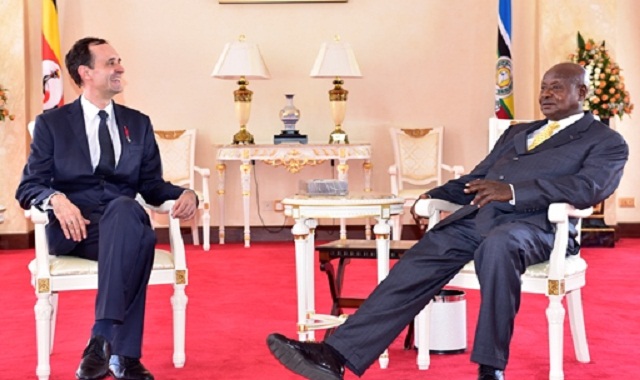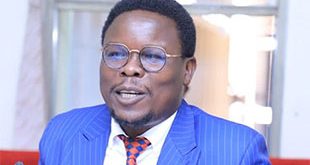
Kampala, Uganda | RONALD MUSOKE | This year, Uganda and Belgium are celebrating 20 years of cooperation. Hugo Verbist, the Belgian Ambassador to Uganda, talked to The Independent’s Ronald Musoke about the bilateral cooperation.
This year, Belgium and Uganda are celebrating 20 years of bilateral relations. What has been the focus?
We are talking about the 20 years since we opened our embassy in Kampala. Before then, our embassy was in Nairobi. Our cooperation dates back to the independence days or even much earlier than that. For example, a company like Sabena (now Brussels Airlines) is an airline that has flown to Entebbe since before Uganda’s independence, and has never stopped.Our cooperation with Uganda has tended to focus on the social sectors (education and health). In education, we have concentrated our efforts on teacher training. We have not only refurbished the national teacher colleges but also improved the management and curriculum of these colleges. We also have a component on skills development because we notice that quite a lot of Ugandan students go to university and when they finish, they don’t find jobs, yet at the same time, some key sectors in the economy sometimes struggle to find the right people. So we are trying to bridge that gap. In the health sector, we have developed the results-based financing concept whereby financing is based more on output than input, meaning that the better the output of the public or private institution is, the more financing they get. This is aimed at stimulating efficiency in the management of the institution.
Any particular reason why Belgium focuses on these two programmes in Uganda?
I think one important way to alleviate poverty in a country like Uganda is to make sure that the population is well educated. You might have many resources like minerals but the most important capital a country can have is its people. But we also have many NGOs in agriculture trying to add value to agricultural products before export and we also have very good university exchange programmes working on value chains in the agricultural sector. These are all small pieces of the puzzle geared towards alleviating poverty.
Have you been promoting trade between Belgium and Uganda?
We have made a lot of effort. Last year we had a very big and important trade delegation come to Uganda. We are very proud that at least two contracts ensued from the visit; in solar energy and agribusiness (milk coolers). Still, we think trade between the two countries has room for improvement and we have to work further on it.
Over the last decade, Uganda has imported US$421.5 million worth of goods and exported goods worth US$ 290.8 million to Belgium. What explains Uganda’s trade deficit with Belgium?
The deficit between Uganda and Belgium is partly because Uganda mainly exports coffee, tea, fish which are unprocessed products while Belgium brings in mainly pharmaceutical products and machinery. But the gap is becoming smaller and it can be solved by creating more value in Uganda itself, and Belgian investments in the country can help. We also give on average about €16 million in development aid every year. So over the last 10 years, that is about €160 million.
What explains the growing Belgian investors’ interest in Uganda?
I think the Belgian investors feel that Uganda has a lot of potential. You have a climate which is good for agriculture. Uganda also has a pool of young, talented and motivated people with whom investors are keen to work. Uganda is still not yet industrialized and this means that there is a lot of potential for investors to come here and industrialise. The risks might be higher because of political fragility of the region but Uganda’s potential makes it quite attractive for Belgian investors.
What particular challenges do Belgian investors face while doing business in Uganda?
I think the most important one is actually not a secret: the level of corruption in this country remains quite high. You have some rankings such as Transparency International’s Perceived Corruption Index which ranks Uganda 151out of 180 countries—that is really not good. You have indexes about the Ease of Doing Business (by the World Bank), in which Uganda ranks equally low, which is not only because of corruption but also about too much bureaucracy when it comes to setting up a company. At the beginning of the 10th Parliament after the 2016 election, President Museveni talked about (Kisanja) Hakuna Mchezo—saying that something needs to be done about this corruption in his new term—but maybe we don’t see enough progress.
There appears to be a standoff between the opposition politicians and the government since last year’s hotly contested debate over the removal of an article on the presidential age limit from Uganda’s Constitution. What do you make of this political stalemate?
As far as the change of the constitution is concerned, this is something that I am not going to comment about. It is the freedom of any country to change its constitution according to the rules which exist. The foreign policy of any country is based on a few principles and ours is based on two; the rule of law and the importance of dialogue. I don’t know if you know this but Belgium is a small European country of 10 million people. We have three regions and three communities and we speak three languages (Dutch, French and German). Because of this structure, we sometimes have disagreements about national issues which sometimes cause conflicts yet since Belgium’s founding in 1830, the number of Belgians who have died in the streets because of disagreements is very small. People have always thought that Belgium could split but that has never happened because we always keep the channels of dialogue open. We always look at what unites us more than what divides us. So we have learned that it is always good to have a sense of compromise and a willingness to talk and dialogue.
Indeed, some observers have suggested that Uganda probably needs an honest national dialogue to fix this situation. What’s your take?
We are in favour of an honest national dialogue in this country. At the end of the day, I still believe that everyone in Uganda wants the best for the country even though there might be different views about how to achieve this. So we are totally in favour of such a dialogue.
 The Independent Uganda: You get the Truth we Pay the Price
The Independent Uganda: You get the Truth we Pay the Price



